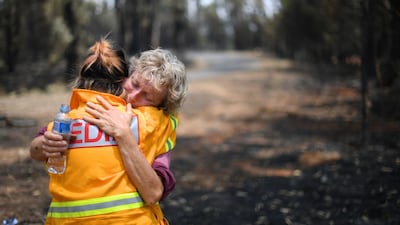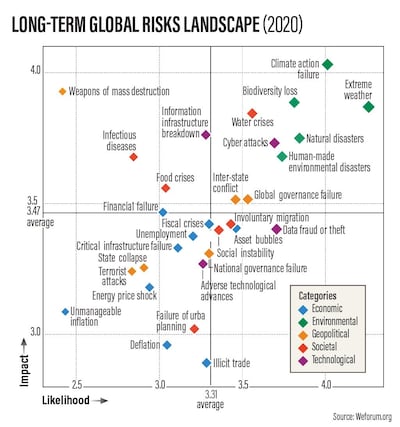Natural disasters, extreme weather and biodiversity loss are among the top concerns for global business leaders this decade, according to the World Economic Forum.
For the first time since the first survey in 2007, the top five most likely long-term risks are all environmental.
They are; first; extreme weather events with major damage to property, infrastructure and loss of human life, second; failure of climate-change action.
In third; natural disasters such as earthquakes, tsunamis, volcanic eruptions and geomagnetic storms, fourth; major biodiversity loss, fifth; human-made environmental disasters such as oil spills or radioactive contamination.
Over 750 chief executives, experts and decision-makers were asked to rank their biggest concerns over the next ten-years as part of the Global Risks Report 2020, released on Wednesday ahead of the World Economic Forum's annual meeting in Davos next week.
Climate activists including Greta Thunberg will be in the Swiss resort to urge leaders to reduce investments in fossil fuels.
Australia, which is currently being ravaged by bushfires, which have been linked to climate change effects, is still investing in fossil fuels which sends a "confusing message", said Peter Giger, group chief risk officer at Zurich Insurance, one of the authors of the report.
“In boardrooms and governments, now is the time to take action,” said Mr Giger.
John Drzik, chairman of Marsh & McLennan Insights, another author of the report, said that it is "striking to have all of the matrix of long-term risks coming from environment".
The results show the change from just a few years ago when in 2015, 2016 and 2017, environmental-related concerns accounted for no more than two of the top-five risks.
Mr Drzik said that the change has also meant that businesses were now more likely to take action.
“There is mounting pressure on companies from investors, regulators, customers, and employees to demonstrate their resilience to rising climate volatility”.
This week, the world's biggest money manager BlackRock said it is exiting some of the investments carrying sustainability risks and said the environmental concerns will be at the core of all new investments.
In the short-term, 78 per cent surveyed said they expect “economic confrontations” and “domestic political polarisation” to rise in 2020. Cyber-attacks are also expected to rise this year.
Mr Drzik said that there is an "unfortunate" intersection between the short-term and long-term risks where partisan politics at the national level including protectionist trade policies will make it harder for countries to come together and find solutions to the broader problems facing the world like climate change.
While there will be some optimism once China and US sign a phase 1 trade deal as expected on Wednesday their "strategic competition is not going to stop" in areas such as technology, Mr Drzik said.
Equally, the result of elections in the US later this year would not necessarily mean the end of a "deeply polarised society" and there could continue to be a lot of uncertainty regardless of who is in power, he said.




